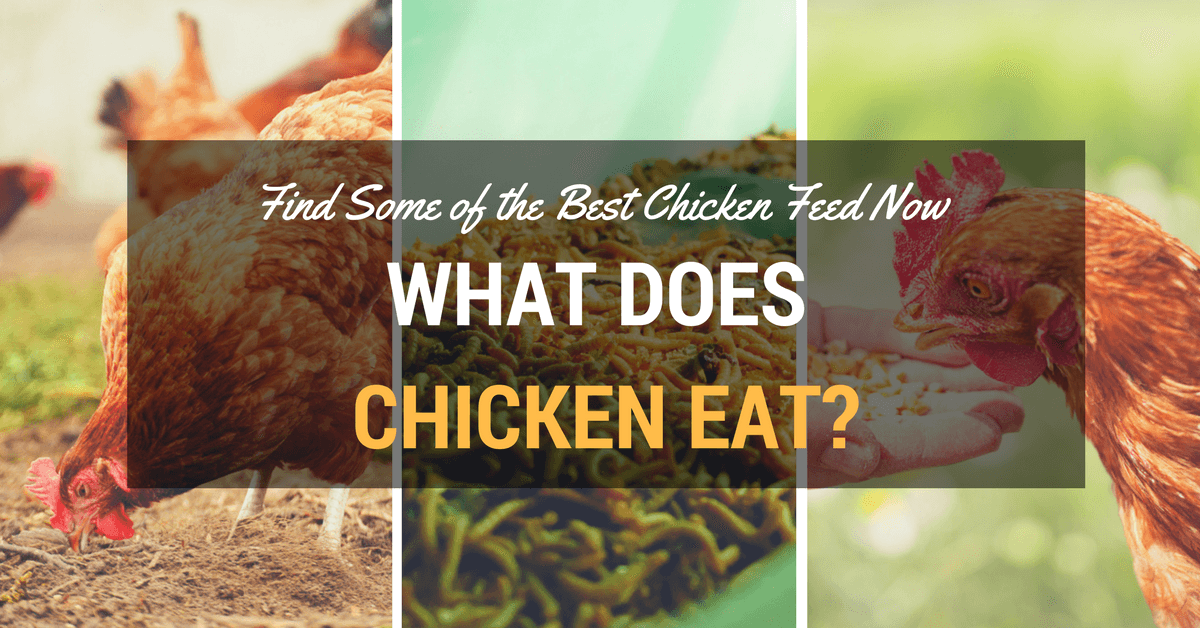What Does Chicken Eat? Find Some of the Best Chicken Feed Now
What you choose to feed your precious poultry with may just be the most significant part of rearing backyard chickens. Their diet can give you either happy and healthy birds or the sad opposite. Malnourished chickens on poor diets will lead to illness, low egg production, and quality, as well as aggressive behavior. Are you currently wondering “what does chicken eat?” Stick around, and you’ll find the answer right here!
More...
Feed your Chickens
What Do Chickens Eat?

A straightforward answer to this inquiry would be, “anything and everything!” That’s right since chickens are omnivores, you’d find them eating anything they can fit into their beaks, including other small omnivores. If you grew on a farm or raised backyard chickens, you’ve undoubtedly seen them gobble up all kinds of things, including dirt, bugs, grass, fruits, and animal remains.
Personally, I’ve seen chickens happily slurp up a line of spaghetti, peck at some collard greens, and, more disturbingly, nibble at some fried chicken skin that fell on the floor. Requiring around 230 calories per day, chickens will happily eat most of what it finds. What else do you expect from the animal that is closely related to the voracious Tyrannosaurus Rex?
However, what chickens eat aren’t necessarily what they should eat.
What Should Chickens Eat?

Poultry Pellets
First, you should start with a high-quality poultry pellet. Quality poultry pellet (like this one here) should be at the center of you chickens’ complete and balanced diet. Chicken pellets will account for most of the protein, minerals, calcium, and vitamins that your chickens need to grow, stay healthy, fight disease, and produce high-quality eggs.
However, poultry pellets are hardly a balanced diet on their own. An ideal complement to chicken pellets should be next on your list.
Grain
An excellent supplement to poultry pellets is grain such as peas, corn, barley, and others. From grain, your chickens will get essential nutrients such as fiber, ash, and fat. Also, grain-augmented poultry pellets will resemble the natural diet that chickens would typically feed on in the wild. Moreover, you can easily get organic grain feeds for your precious layers. Here’s a grain feed we can recommend.
Fruits and vegetables
No balanced diet is complete with fresh fruit and vegetables. This same standard goes for chickens too! For a well-rounded diet, you can try feeding your chickens raw vegetables and fruits such as cabbage, banana slices, apples, spinach and so on.
Grit
Imagine trying to eat without teeth! Although chickens have their beaks, grit is still an important diet item (get some grit here) for chicken digestion. Without getting too technical, chickens use grit to grind their food so their bodies can properly absorb the nutrition. Conversely, a diet insufficient in grit can lead to digestion problems and disease in your poultry.
Table scraps
A balanced diet is often a varied one. Hence, your chickens will likely benefit from receiving a diverse range of table scraps into their diet. They’ll happily eat anything from coffee grinds and kitchen scraps. Interestingly, when it comes to variety, chickens can also be quite finicky, so you’ll need to do some trial and error to find the scraps that your chickens enjoy.
Calcium Sources
You can also incorporate good sources of calcium into your chickens’ diet, and one of the best sources are oyster shells (here’s a good one). Typically, poultry will get their recommended amounts of protein from their regular diets. However, calcium supplementation is vital for egg-layers if they will be producing eggs excelling in both quantity and quality.
Treats

Your chickens will enjoy the occasional treat as well. We’ve seen chickens go crazy for mealworms, cracked corn, and even broccoli! Don’t go overboard with the mealworms though, as they may deliver too much protein for your birds.
What you should avoid
Here’s the line where omnivore ends, and toxicity begins. Again, despite the Omnivore label, there is still some food doesn’t belong in your chicken feeder.

Onions
Onions contain thiosulphate, a substance toxic for your chickens.
Chocolate
Dogs aren’t the only ones that should avoid chocolate. Your chickens also share the sensitivity to theobromine, ingestion of which can be particularly fatal.
Raw Eggs
Many chicken owners advocate the use of raw eggs as an additional source of calcium. However, there are several disadvantages to this. First of all, raw eggs alone may not be enough to supplement a calcium deficiency in chickens. Second, and an even bigger downside is that feeding your chickens fresh eggs may lead them to start eating their unhatched eggs as well.

Conclusion
Feeding a voracious omnivore (the chicken, not the T-Rex) shouldn’t be difficult. Just remember the six essential diet items that chickens should eat, and you should have healthy poultry and productive egg-layers! Conversely, keep also in mind the things that chickens shouldn’t eat and could be toxic to them.


